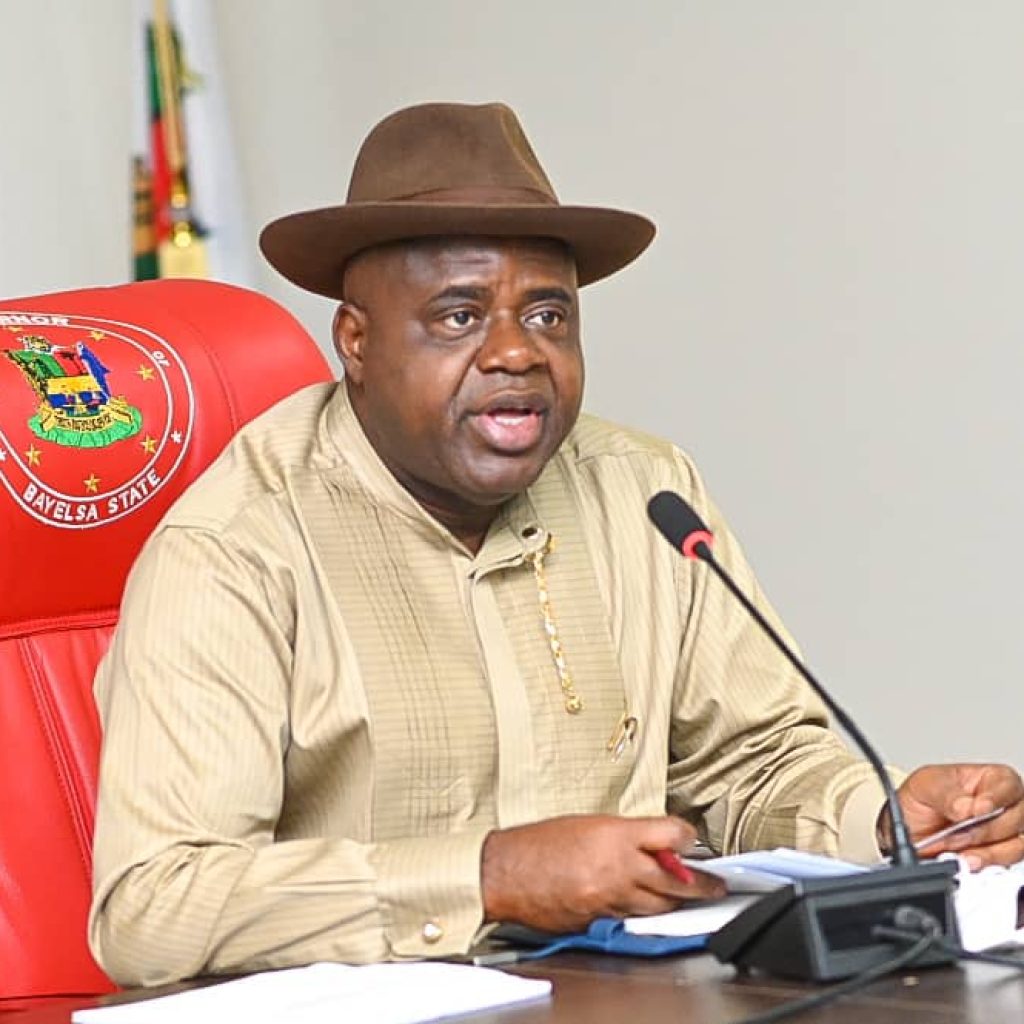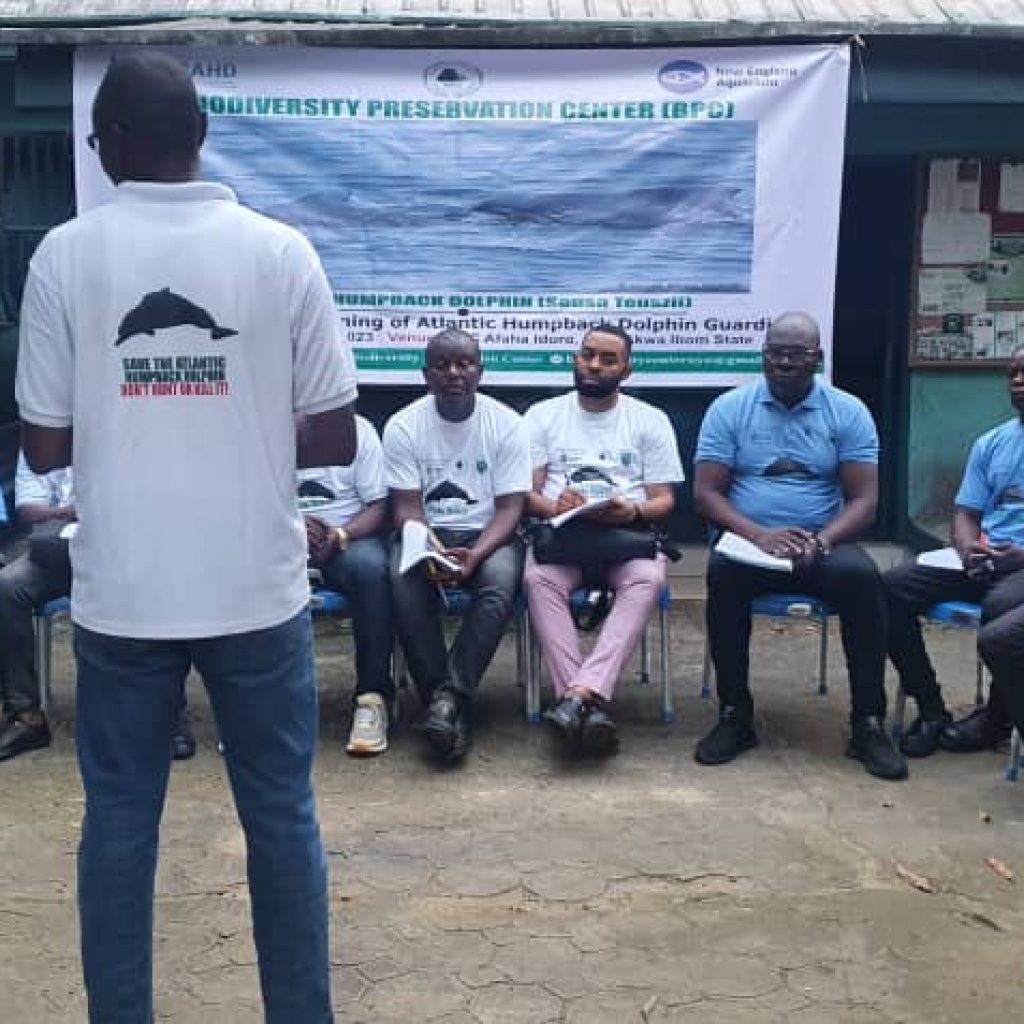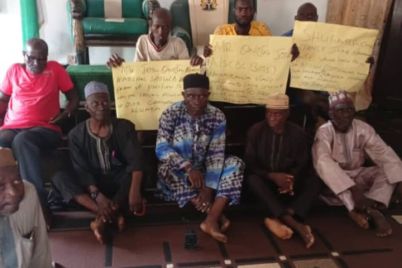
The publisher of the Blue Economy magazine online and Senior Special Assistant (SSA) to Bayelsa State Governor on Tourism, Dr. Piriye Kiyaramo has lamented that the population of whale and dolphin fauna of the West Africa region has been threatened by local hunting, industrial fishing, seismic surveying for oil and gas, and coastal development, adding that marine mammal which is diverse in nature has remained unstudied, unprotected and in many regions.
Delivering a paper on “Marine Mammals and the Emerging Blue Economy” at the inauguration and commencement of research/training of the pioneer set of Dolphin Guardians for long-term sustainability of the Atlantic humpback dolphin (Sousa teuszil) for Akwa Ibom, Cross River and Rivers States, at the Biodiversity Preservation Center (BPC) Afaha Idoro, Uyo, on Monday, Dr. Kiyaramo noted that aquatic creatures have enormous economic advantages in addition to their ecological importance, such as fisheries, providing sustenance and livelihoods to millions of people worldwide.
The publisher, who was represented by the Chairman, Akwa Ibom Tourism and Hospitality Practitioners Association (AKTHOPA), Amb. Usen Udoh, the untiring efforts of the Director of the Biodiversity Preservation Centre, Uyo, Prof. Eniang Edem for setting up the laudable dolphin project in Uyo, which focuses attention on the study of the Atlantic humpback dolphin (Sousa teuszii) found only in West African waters and is in decline throughout its range.
He noted that “the blue economy opens a path for us to help preserve and restore endangered marine mammals, but the question is, how can we concretely act in this regard?
The whale and dolphin fauna of the West Africa region is diverse, but also unstudied, unprotected and in many regions, being at risk from threats such as local hunting, industrial fishing, seismic surveying for oil and gas, and coastal development.

“The blue economy therefore discusses improvements of the overall management of waters, economic development, but also of the preservation, repair and restoration of the marine ecosystems at risk due to different huge threats, including uncontrolled fishing, climate change, oil pollution, and plastic pollution.
“I like to call on the governors in the south-south region to support this project, which is aimed at documenting humpback dolphins with a view to highlighting ‘hotspots’ – important habitat areas for this species. This project could possibly lead to the designation of protected areas for West Africa’s only endemic dolphin.
“Our aquatic wildlife are important sources of food, energy, jobs, atmospheric oxygen, buffers against new diseases, pests, and predators, and protection against food shortages and global climate change. All ecosystems have their own balance, including the marine world. The oceans are massively challenged by different threats, day by day.
Dr. Kiyaramo said that marine mammals possess great economic, nutritional, medicinal, industrial, aesthetic, and religious values, as well as they provide employment for millions of people around the world, resetting that overfishing, driven by excessive demand, has often threatened the delicate balance of marine ecosystems in the West African sub-region largely due to poor legislation.
“Have you ever wondered why our relationship with water is so symbiotic? After all, we all come from water, and we surely have an intrinsic bond with it. Water plays a vital role in the global climate and temperature balance. About 80% of Earth consists of seas and oceans, which undoubtedly affect everything that surrounds us. When humans negatively impact the water bodies, the effects on the globe become huge, “Dr. Kiyaramo maintained.
“According to the World Bank, the Blue Economy is the sustainable use of ocean resources for economic growth, improved livelihoods, and jobs while preserving the health of ocean ecosystems. Its scope of interpretation varies among organizations. However, the term is generally used in international development content when describing a sustainable development approach to coastal resources.
“Therefore, to achieve AU’s Africa Blue Economy Strategy, Africa’s governments at all levels, private and nongovernmental organizations and the continent’s international supporters have to put their money where their mouth is by investing in a sustainable and inclusive Blue Economy.

“Creating an enabling environment for sustainable ocean finance that prioritizes cost-effective options to guide investments in the Blue Economy is crucially needed for Africa’s ocean sustainability and climate change adaptation and mitigation goals Such policy reforms will help Africa maximize the prospects for development and poverty reduction in a sustainable manner.
“Also, commercial, recreational, and subsistence fisheries would bring in many millions of pounds of fish and dollars each year to coastal communities. People also use the ocean and shoreline for boating, sightseeing, vacationing, and other recreational activities.
Despite its beauty, the ocean is a major hub of economic activities.
In order to effectively manage and conserve cetaceans, we first need to know where they are found, population sizes, and the threats they are vulnerable to.
“This includes a wide range of economic sectors, including conventional fisheries, aquaculture, maritime transport, marine tourism, coastal renewable energy, and many other more,” he reiterated.
On his part, Executive Director of Biodiversity Preservation Centre, Uyo, Prof. Edem Eniang described the dolphin project inauguration as a great moment to be remembered by all participants, informing that the ‘Dolphin Guardians’ Train the Trainer programme was the first of its kind to be carried out in Nigeria.
Prof. Eniang said he was grateful to the people who facilitated that funding and support, particularly, the Consortium for the Conservation of the Atlantic Humpback Dolphin (CCAHD) in the Netherlands and the actual sponsor, New England Aquarium, a nonprofit organization located in Boston, Massachusetts USA for their sponsorship and goodwill towards the conservation of the marine mammal species.
“Without them, we wouldn’t have gotten this training. We appreciate all the stakeholders, especially the community leaders, the chiefs of Afaha Idoro, in Uyo Local Government Area, Mbo Local Government Area of Akwa Ibom State and Andoni LGA of Rivers State. We are grateful to the Director of the Centre for Wetlands and Waste Management Studies, University of Uyo, Prof. Mrs. Imaobong Ekpo, who led her students to participate in the training.
“In the words of Prof. Richard King, he said, and I quote, “I have gone around the world. I have attended international workshops and conferences. I have not seen this level of sophistication, advancement, and genuineness of the training workshop I attended at BPC Uyo in South South Nigeria.” Kudos to the first batch of dolphin guardians in Nigeria.

“I am so much indebted to the Conservator General of National Parks Service of Nigeria who sent the Conservator of Parks in charge of Cross River National Park, Madam Caroline Olory to represent him. I am also grateful to His Excellency, Pastor Umo Bassey Eno, Executive Governor of Akwa Ibom State, ably represented by the Special Adviser on Tourism, Mrs. Ime Udo. We are honoured to have the Nigerian Institute of Marine and Oceanography Research, represented by Dr. Bolaji Dunsin
“We commend Prof. Mfon T Udoh, a Professor of Fisheries from the Dept of Fisheries and Aquatic Environmental Management, Uniuyo, Prof. Richard King of BPC, Hon. Chris Abasi Eyo, Senior Special Assistant (SSA), is the governor of Akwa Ibom State, President of Rotary International Uyo, Dr. Mrs. Udobang, who chaired the epoch making pioneering dolphin guardians training project.
“I am delighted to have the Head of Department of Forestry and Wildlife, University of Uyo, whose students came in large numbers to attend the inauguration, led by Dr. Idorenyin Gideon and Koko Sunday. We are very happy for the staff of BPC who worked assiduously to ensure the success of this programme.
“This group of committed Nigerians who decided to be pioneer dolphin guardians with their goal of sustainable preservation of the Atlantic Humpback Dolphin under the blue economy concept of the world and climate change in an attempt to diversify the economy of Nigeria will succeed and the goals will be achieved. The Atlantic humpback dolphin will succeed and survive in Nigeria throughout its habitats across all regions of Africa.
“I like to sincerely appreciate Mr. Idala (Idaladolphin), the man who first killed the Atlantic humpback dolphin from Oyorokoto community in Andoni Island, as part of the maiden edition of the dolphin guardians training programme as well as his benefactor, Mr. Gogo Ujile. I am also grateful to the two senior fishermen who came from Mbo Local Government Area of Akwa Ibom State for the training.
“We are happy to have three students from the University of Uyo, including members of BPC, Uyo, a student from the University of Agriculture Umudike, another student from the University of Calabar, a Ranger from Cross River National Park, who all formed part of the first batch of twelve dolphin guardians in Nigeria that have signed up as the pioneer dolphin guardians to focus on Atlantic Humpback Dolphin conservation in Nigeria.
“We are proceeding to the field in Andoni Island, and we will be there throughout the rest of the week to fulfil the practical component of the training that has lasted this long.” Prof. Eniang said.
Dr. Uzoma Ejimadu presented a paper on the importance of Conserving Marine Mammals, Amb. Usen Udoh, Chairman of Akwa Ibom Tourism and Hospitality Practitioners Association (AKTHOPA), represented the Senior Special Assistant (SSA) to Bayelsa State Governor on Tourism, Dr. Piriye Kiyaramo to deliver a paper on Marine Mammals and the Emerging Blue Economy, Hon. Dr. Chris Abasi Eyo spoke on Tourism Potentials in the Marine Areas of Akwa Ibom State, Prof.

Richard P. King delivered a paper on Fisheries and Emergence of the Blue Economy, Dr. Emem Inyang presented a paper on Fishing Communities and the Emerging Blue economy, while Dr. Comfort Udobang, President of Rotary International Uyo, spoke on Call to Selfless Service. President of BPC, Dr. Clement O. Ebi was on the ground to coordinate activities at the event.
It would be recalled that with only around 1,500 adults remaining, Atlantic humpback dolphins are critically endangered and in desperate need of protection from burgeoning threats. Atlantic humpback dolphins could become the first species of dolphin to become extinct solely as a result of being hunted and/or eaten to extinction.


